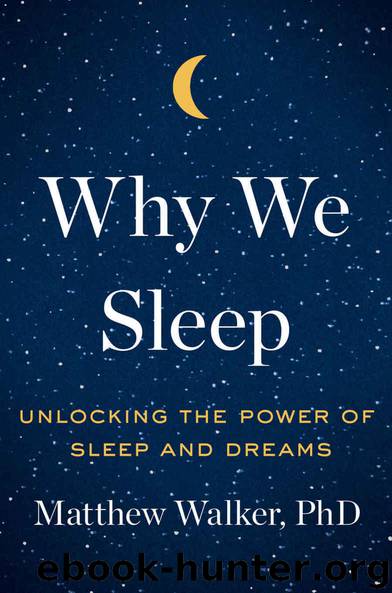Why We Sleep: Unlocking the Power of Sleep and Dreams by Matthew Walker

Author:Matthew Walker [Walker, Matthew]
Language: eng
Format: epub, mobi, azw3
Publisher: Scribner
Published: 2017-10-03T05:00:00+00:00
SLEEP LOSS, GENES, AND DNA
If increasing your risk for developing Alzheimer’s disease, cancer, diabetes, depression, obesity, hypertension, and cardiovascular disease weren’t sufficiently disquieting, chronic sleep loss will erode the very essence of biological life itself: your genetic code and the structures that encapsulate it.
Each cell in your body has an inner core, or nucleus. Within that nucleus resides most of your genetic material in the form of deoxyribonucleic acid (DNA) molecules. DNA molecules form beautiful helical strands, like tall spiral staircases in an opulent home. Segments of these spirals provide specific engineering blueprints that instruct your cells to perform particular functions. These distinct segments are called genes. Rather like double-clicking open a Word file on your computer and then sending it to your printer, when genes are activated and read by the cell, a biological product is printed out, such as the creation of an enzyme that helps with digestion, or a protein that helps strengthen a memory circuit within the brain.
Anything that causes a shimmy or wobble in gene stability can have consequences. Erroneously over- or under-expressing particular genes can cause biologically printed products that raise your risk of disease, such as dementia, cancer, cardiovascular ill health, and immune dysfunction. Enter the destabilizing force of sleep deprivation.
Thousands of genes within the brain depend upon consistent and sufficient sleep for their stable regulation. Deprive a mouse of sleep for just a day, as researchers have done, and the activity of these genes will drop by well over 200 percent. Like a stubborn file that refuses to be transcribed by a printer, when you do not lavish these DNA segments with enough sleep, they will not translate their instructional code into printed action and give the brain and body what they need.
Dr. Derk-Jan Dijk, who directs the Surrey Sleep Research Center in England, has shown that the effects of insufficient sleep on genetic activity are just as striking in humans as they are in mice. Dijk and his prolific team examined gene expression in a group of healthy young men and women after having restricted them to six hours of sleep a night for one week, all monitored under strict laboratory conditions. After one week of subtly reduced sleep, the activity of a hefty 711 genes was distorted, relative to the genetic activity profile of these very same individuals when they were obtaining eight and a half hours of sleep for a week.
Interestingly, the effect went in both directions: about half of those 711 genes had been abnormally revved up in their expression by the loss of sleep, while the other half had been diminished in their expression, or shut down entirely. The genes that were increased included those linked to chronic inflammation, cellular stress, and various factors that cause cardiovascular disease. Among those turned down were genes that help maintain stable metabolism and optimal immune responses. Subsequent studies have found that short sleep duration will also disrupt the activity of genes regulating cholesterol. In particular, a lack of sleep will
Download
Why We Sleep: Unlocking the Power of Sleep and Dreams by Matthew Walker.mobi
Why We Sleep: Unlocking the Power of Sleep and Dreams by Matthew Walker.azw3
This site does not store any files on its server. We only index and link to content provided by other sites. Please contact the content providers to delete copyright contents if any and email us, we'll remove relevant links or contents immediately.
| Administration & Medicine Economics | Allied Health Professions |
| Basic Sciences | Dentistry |
| History | Medical Informatics |
| Medicine | Nursing |
| Pharmacology | Psychology |
| Research | Veterinary Medicine |
Periodization Training for Sports by Tudor Bompa(7889)
Why We Sleep: Unlocking the Power of Sleep and Dreams by Matthew Walker(6303)
Paper Towns by Green John(4753)
The Immortal Life of Henrietta Lacks by Rebecca Skloot(4224)
The Sports Rules Book by Human Kinetics(4045)
Dynamic Alignment Through Imagery by Eric Franklin(3890)
ACSM's Complete Guide to Fitness & Health by ACSM(3791)
Kaplan MCAT Organic Chemistry Review: Created for MCAT 2015 (Kaplan Test Prep) by Kaplan(3774)
Introduction to Kinesiology by Shirl J. Hoffman(3603)
Livewired by David Eagleman(3514)
The River of Consciousness by Oliver Sacks(3384)
The Death of the Heart by Elizabeth Bowen(3311)
Alchemy and Alchemists by C. J. S. Thompson(3268)
Descartes' Error by Antonio Damasio(3139)
Bad Pharma by Ben Goldacre(3065)
The Gene: An Intimate History by Siddhartha Mukherjee(2897)
The Emperor of All Maladies: A Biography of Cancer by Siddhartha Mukherjee(2882)
The Fate of Rome: Climate, Disease, and the End of an Empire (The Princeton History of the Ancient World) by Kyle Harper(2838)
Kaplan MCAT Behavioral Sciences Review: Created for MCAT 2015 (Kaplan Test Prep) by Kaplan(2781)
